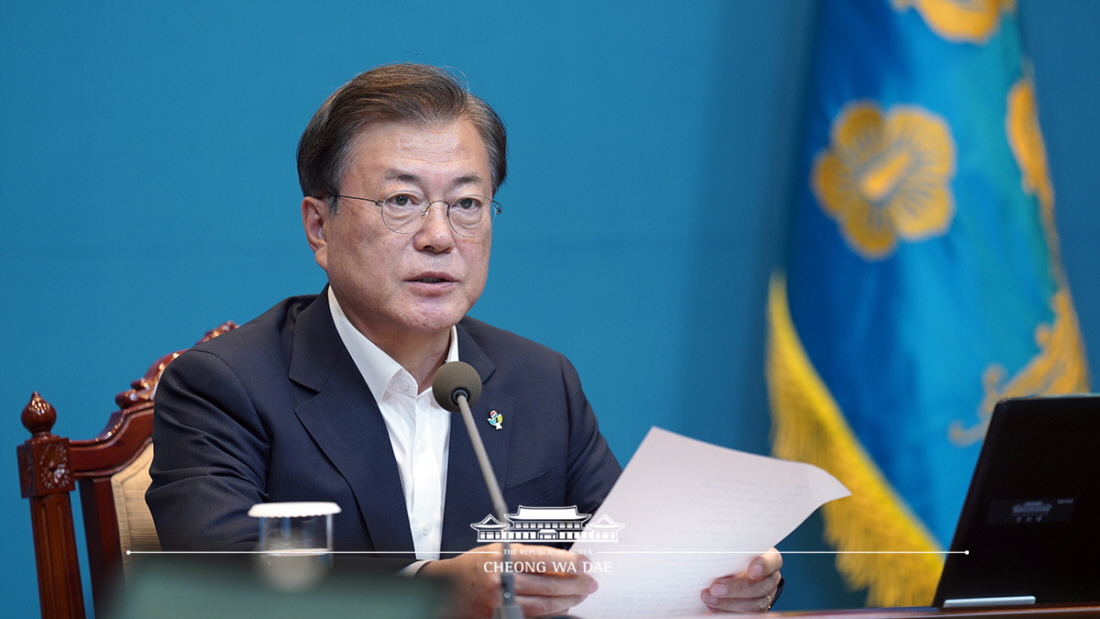이 웹사이트는 제19대 대통령 임기 종료에 따라 대통령기록관이 「대통령기록물 관리에 관한 법률」에 의해 이관받아 서비스하는 대통령기록물입니다. 자료의 열람만 가능하며 수정 · 추가 · 삭제는 불가능합니다.
다만, 「개인정보보호법」에 의하여 개인의 정보를 보호받기 원하시는 분은 관련 내용(요청자, 요청내용, 연락처, 글위치)을 대통령 웹기록물 담당자(044-211-2253)에게 요청해 주시면 신속히 검토하여 조치해 드리겠습니다. 감사합니다.
SPEECHES & REMARKS
BRIEFINGS

The controversy surrounding the movement supporting the former comfort women is very bewildering. I am cautious about bringing this up, but the main point I want to say is that the comfort women movement’s cause must be firmly protected. The 30-year history of the movement has been marked by steps toward preserving human dignity and promoting peace and women’s human rights. We should not undermine the noble spirit of realizing these universal values of humanity.
The late grandmother Kim Hak-sun’s historic testimony prompted the start of the comfort women movement. She and other victims broke the wall of silence and shouted, “I am living proof.” They told the truth about horrific abuse and called for a just resolution of the issue on the streets and in the courtrooms as well as in and outside the country.
They let the world know the horrendous wartime crime of sexual violence against women. The issue has developed into a discussion about universal human rights and peace, going beyond historical issues between Korea and Japan.
They have given immense encouragement to wartime sex crime victims in many parts of the world. They have also elicited empathy and support from the international community, including the United Nations, thus becoming a global symbol of the women’s human rights movement. All of this has been made possible because these elderly victims voluntarily served as the movement’s principal actors, acting resolutely and courageously.
Many of them have now passed away, and only 17 grandmothers remain with us. They are all living witnesses to the truth of comfort women. In particular, Grandmother Lee Yong-soo symbolizes the history of the comfort women movement. She has played a profound role in making the comfort women issue a global matter. She became the first to vividly testify about the matter before the U.S. House of Representatives, thereby making a decisive contribution to the adoption of the resolution that urged the Japanese Government to apologize and accept historical responsibility.
She also testified for the first time before the French National Assembly. Despite her advanced age of 90, she campaigned to have records related to the comfort women inscribed on the UNESCO Memory of the World Register.
We cannot think of a comfort women movement that excludes our grandmothers, the comfort women victims. They have given testimonies about their horrendous lives and led the movement to date. These acts in themselves attest to their dignity even in the absence of any one else’s acknowledgements.
The comfort women movement has evolved through civil society’s voluntary participation and solidarity. Our elderly victims have become activists themselves for women’s human rights and joined hands with the victims of wartime sexual violence worldwide. Numerous activists from civic groups banded together, and citizens also joined forces with them. Even young students have participated in the Wednesday rallies and endeavored to make sure that the issue does not remain hidden in the past.
As a result of solidarity and cooperation over the past 30 years among the victims, activists and citizens, the comfort women movement has established itself as a human rights movement in world history. It is a history that can never be denied or denigrated. Civic movements have made progress along with civic consciousness. The controversy this time has served as an opportunity as well to reflect upon civic organizations’ practices and the way they work.
However, attempts in some quarters to deny the comfort women movement itself and damage its great cause is unjust. It is even tantamount to destroying the dignity and honor of victims. It is a fundamental challenge to the legitimacy of a movement that denounced a war crime against humanity and dedicated itself to upholding the value of women’s human rights.
The comfort women movement is still in progress. The wounds of the victims have not been entirely healed, and a sincere apology and reconciliation have not been attained. Historical truths must be disclosed entirely and recorded; they must be etched into lessons from history for the coming generations and our posterity.
There is a saying, “The ground hardens after a rain.” I hope that the current controversy and ordeal will serve as an opportunity to sublimate the movement constructively. Most of all, by taking this controversy as an opportunity, the Government will establish an integrated management system for donations to fundamentally strengthen the transparency of donations and fundraising activities. If people can find how their donations are used in a transparent manner, their good intentions will be appropriately fulfilled and the culture of donating will advance.
We will transparently manage subsidies distributed by the central and local governments. I ask civic organizations to work together as well. I would also like to see people gather their wisdom so that this can lead to constructive discussions for the development of the civic movement.



